Whether you want to grow your business, help your clients achieve their goals, and/or improve your confidence on camera, you’d benefit from learning about neuro-linguistic programming (NLP).
In order to truly understand what NLP is, how it relates to business, and why it’s so important, Jessika Phillips and Mike Gingerich invited expert Stephanie Liu onto Magnet Marketers.
Stephanie Liu is a live video strategist for brands and entrepreneurs–from moonwalkers to MasterChef's–who want to go from unknown to unforgettable. A digital marketing expert with 15 years of ad agency experience, she has helped thousands of her clients and students get on the Fascination Fast Track™ to ignite their ideas and become confident on camera.
 As a certified Neuro-Linguistic Programming Trainer, Stephanie teaches brain hacks to help people overcome their fears of public speaking by rewiring their minds for success. With her proven system, clients discover how to create crave-worthy content, get audiences buzzing with excitement, and how to deliver a spell-binding presentation that hooks viewers in.
As a certified Neuro-Linguistic Programming Trainer, Stephanie teaches brain hacks to help people overcome their fears of public speaking by rewiring their minds for success. With her proven system, clients discover how to create crave-worthy content, get audiences buzzing with excitement, and how to deliver a spell-binding presentation that hooks viewers in.
Her client, MasterChef Claudia Sandoval, drove 178K downloads of her book from her first live stream within 24 hours. She’s also coached astronaut Jessica Meir and her team for a live interview in space.
Named as one of the Top 50 Digital Marketing Thought Leaders by the University of Missouri St. Louis, her work has been recognized and awarded by Forbes, Online Marketing Media And Advertising, PR Daily, Forrester, and Gartner 1to1 Media.
Stephanie is the host of Lights, Camera, Live, and the co-founder of Leap Into Live Streaming Bootcamp. She has spoken at Social Media Marketing World, VidCon, Podcast Movement, and many more. Stephanie is the co-author of Ultimate Guide to Social Media, published by Entrepreneur Press. She lives in San Diego, CA.
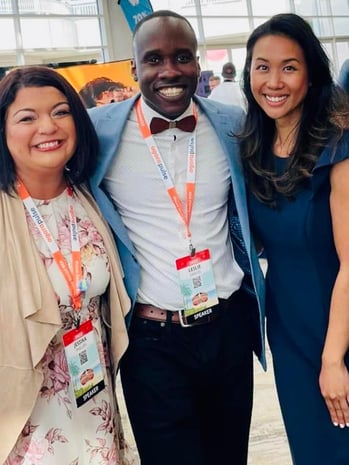
What is Neuro-Linguistic Programming:
Understanding NLP means breaking down the three components of the phrase: neuro, linguistic, and programming.
Neuro is all about how we process information. Linguistics is about how our thoughts become our words. The programming aspect is how we’re wired; it’s the unconscious programming of how we work towards goals.
In essence, NLP Is about understanding both ourselves and others - from our value systems to our communication styles and preferences.
By understanding how you (and or an ideal client) process information, you can enhance the experience by delivering information in their preferred style.
Similarly, by diving into linguistics, you can better understand your (and others’) values, beliefs, and attitudes.
It’s about listening to the subtle queues; when you hone in on that, you can offer people the solutions that you know they need.
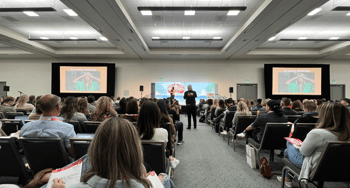 This is why NLP is so important; it allows us to get to know ourselves better and serve as more effective communicators.
This is why NLP is so important; it allows us to get to know ourselves better and serve as more effective communicators.
AKA, NLP lets us become better strategists, listeners, friends, leaders, parents, and partners.
Applying NLP To Business:
Through NLP, you can more easily pick up on someone’s communication style and value system which lets you frame information in a way that’s both significant and persuasive to them. This is hugely helpful when pitching new clients!
Similarly, NLP training helps business owners become more aware of what motivates them and drives them; this enables better decision-making, especially in high-pressure situations.
Another part of neuro-linguistic programming is the process of chunking information; aka determining whether someone is aided by audio or visuals in their decision-making process.
It’s both a self-discovery practice AND a curiosity practice that enables us to better understand both how we, and others, process information.
 This is critical in a business environment because when working with clients, we want to know how to best present information to them - aka whether to lean into our auditory or visual options - in a way that sticks.
This is critical in a business environment because when working with clients, we want to know how to best present information to them - aka whether to lean into our auditory or visual options - in a way that sticks.
If they are visual learners, a phone call won’t cut it. If our client prefers audio, showing a bunch of slides on a zoom call isn’t necessarily helpful.
Similarly, if our client values freedom and flexibility above all and we keep talking about how much money we can help them make, we won’t be effective in our communication.
NLP teaches us how to listen to (and for) what our clients truly value and believe.
Those who invest in NLP training become more effective communicators AND leaders because they take the time to hone in on their value system. By doing that, they can easily figure out who the right people are to attract as both teammates and clients.
Jessika truly saw her life transform as a result of neuro-linguistic programming training; it opened up her mind as a parent, business owner, and public speaker. 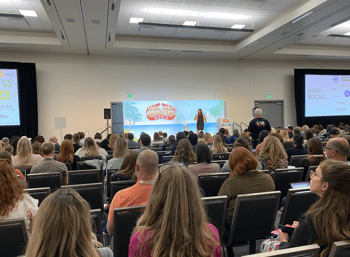
For example, Jessika placed a workbook on everyone’s chair for her “Relationships to ROI” session at SMMW22.
This was hugely helpful for the hands-on learners in the audience.
Exercises To Try:
There are so many fun ways that you can get started with applying these principles to your life and business.
Below are a few of our favorite exercises and tips for how to get started trying them!
Matching and Mirroring:
This is a way for you to build rapport with your audience at an unconscious level.
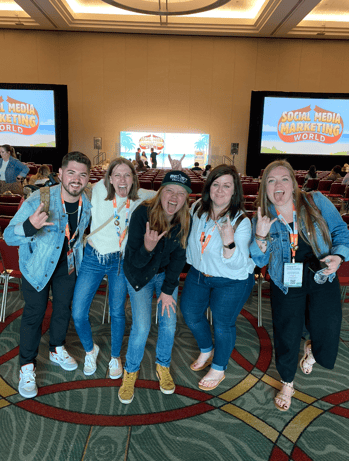 You’ll know that you’re truly skilled at this when you’re speaking on stage and lean back and watch your audience lean back with you; that’s how you know they’re unconsciously following every single thing that you’re saying.
You’ll know that you’re truly skilled at this when you’re speaking on stage and lean back and watch your audience lean back with you; that’s how you know they’re unconsciously following every single thing that you’re saying.
One way to build this skill is to find who your “rapport leaders” are in the audience because the reality is that the people sitting in the back of the room at matching and mirroring what the people in front of them are doing.
Knowing this is hugely powerful as a speaker because it allows you to focus on the most influential people in the room.
Some tips to get started with mirroring and matching:
- Scan the room to see who is mirroring who and then make eye contact with the leaders; they’re probably sitting in the front two rows of the audience.
- Try to get everyone to raise their hand and/or stand up! That’s not only a great connecting moment with the audience, but a powerful photo opportunity.
Anchor Your Words:
This is all about working the room and using your hands in a meaningful way when speaking.
Anchoring your words can help your audience better understand your points.
“When we work the room, we find a place to anchor our words.” @heystephanie (click to tweet)
By using your hands intentionally to “place” specific words or stories somewhere, you help to make your words more impactful.
Anchor Your Feelings:
This kind of anchoring is all about being able to tap into and recall a specific feeling, such as confidence and happiness.
By tapping into the places that make us feel most confident and alive, we can help ourselves step into that powerful emotion when we need it most.
For instance, Mexico is Jessika’s happy place; somewhere that brings her to her most aligned and joyful state of being. Feeling the sand in her toes is soul medicine, and she has the ability to truly tap into that when she needs it.
Chaining and Stacking Anchors:
This practice is about creating new habits, and it starts with understanding that we don’t get to our goals overnight.
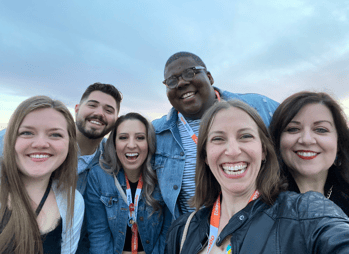 Progress comes in the form of baby steps, and this practice is what allows us to take very small micro-steps towards where we’d like to be.
Progress comes in the form of baby steps, and this practice is what allows us to take very small micro-steps towards where we’d like to be.
For instance, instead of feeling frustrated or mad if someone disrespects Stephanie, she has the ability to calm herself down and laugh, and truly let it roll off her back. It has taken time; aka it’s a practice! It’s a new habit/routine.
By stacking anchors, we can build on each small step that we take so that we can truly go from a to b to c, all the way to z.
Putting It All Together:
Neuro-linguistic programming can be transformative for anyone because it’s all about empowering and teaching people to make little shifts that create a huge impact.
“Nothing changes if nothing changes.” @heystephanie (click to tweet)
If you want to truly take control of your life and/or business, we highly recommend reaching out to Stephanie to inquire about NLP training.
It’s the difference that will make the difference in your personal and professional relationships.
NLP training can equip you with the skills you need to better communicate with everyone around you, help you feel more confident in pitching new business, let you understand where your (and others’) values come from, and allow you to get rid of limiting beliefs.
Have you done any NLP training? What do you think about the exercises we shared above?
We’d love to hear from you!


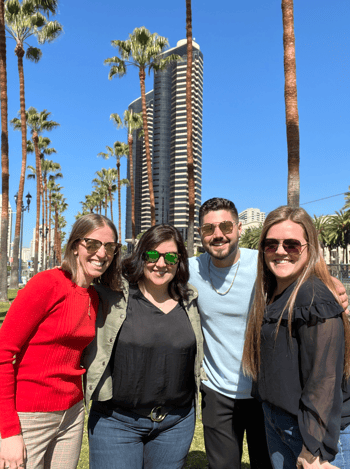

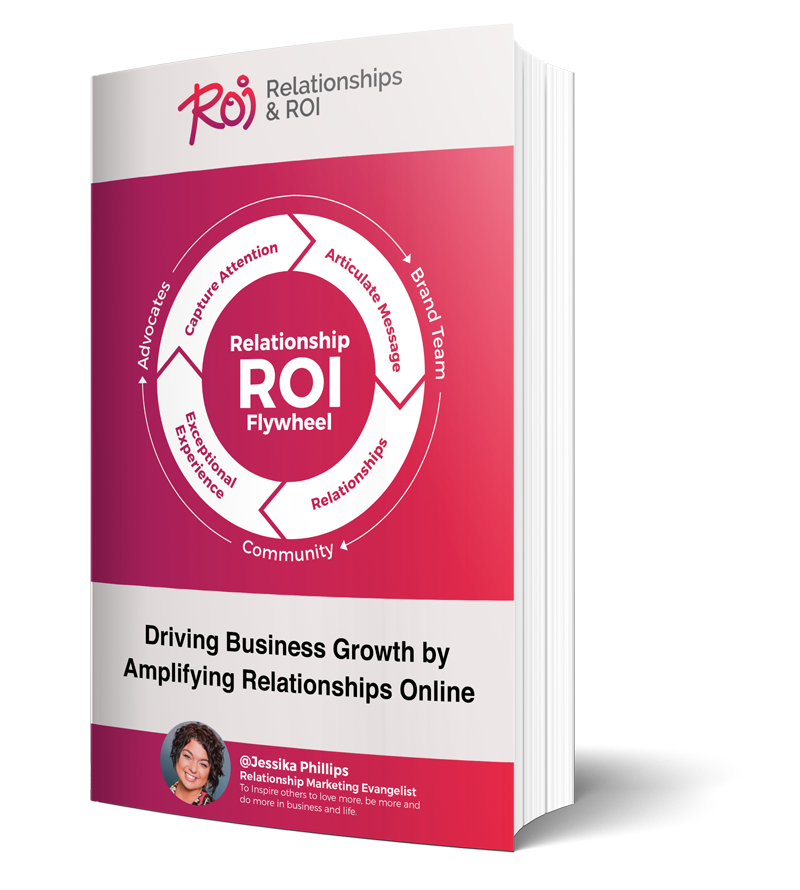
Comments